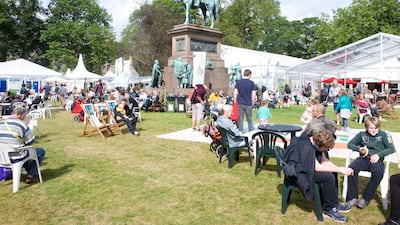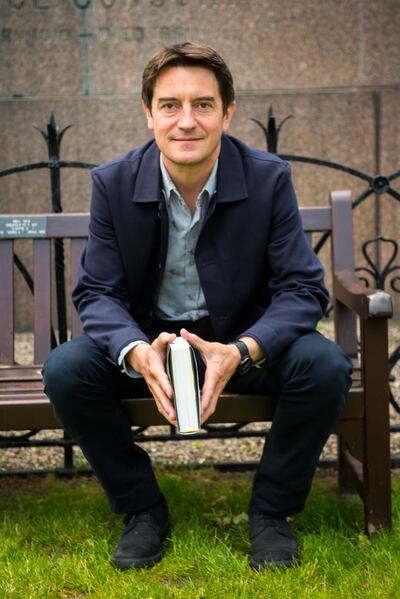Prominent authors from the Middle East face exclusion from one of the world’s leading literary festivals under the UK’s tougher visa regulations.
Organisers at the Edinburgh International Book Festival, which opens on Saturday, say about a dozen authors from the region and Africa had their applications for short term visit visas rejected by UK authorities.
Although most are being now allowed to attend after high level appeals by the festival, up to three are still without visas just days before they were meant to arrive.
The episode has placed the spotlight on the UK visa system, which critics say risks putting on cultural talent off visiting the country.
The identity of the writers, and their nationalities, have not been released by the festival, which says the UK visa application process is “humiliating” and could damage their literary reputation in their own countries.
However, it is understood that one of those still waiting for a visa is the Iranian children’s illustrator Ehsan Abdollahi, who is also the festival’s 2018 Artist in Residence, and who experienced similar problems last year when his application was first rejected by the British Embassy in Dubai.
Another Iranian, children’s writer Marjan Vafaeian, is also still waiting for a visa, according to her British publisher.
More than 900 writers, illustrators and artists from 55 countries are booked to appear at this year’s festival, but organisers say the visa rejection rate has noticeably increased in recent years.
Nick Barley, the festival director said the visa rejections were “an issue which is becoming more prevalent each year".
“We are obviously concerned that the challenges of obtaining a UK visa will have a knock-on effect on the international reputation of not only Edinburgh’s festivals but arts and cultural organisations across the UK," he said.
His concerns were echoed earlier this month by Peter Gabriel, the rock musician and organiser of the Womad world music festival, after three acts were denied entry to the UK this year.
Gabriel, known for hits like Solsbury Hill, Sledgehammer and Biko, warned that the UK was in danger of becoming "a white-breaded Brexit flatland," and "a country that is losing the will to welcome the world".
Citizens of the UAE and several other Arabian Gulf countries, including Oman and Qatar, can enter the UK freely under the electronic visa waiver system introduced in 2014.
For other countries in the Arab world, the process is much more complex and the likelihood of success much less certain.
The Middle East authors initially denied entry to the UK for the Edinburgh festival were required to provide three years of bank statements to prove their financial independence, even though they had received an official invitation that offered a fee and covered their expenses.
One woman writer was forced to reapply three times because British officials question some of the entries on her bank records.
Another was ordered to submit certificates for his birth and marriage and the birth certificate for his daughter. He was then told he would need biometric testing to determine his identity.
______________
Read more:
Music takes a funny turn at this year's Edinburgh Festival Fringe
Landmark debut for Arab performers at Edinburgh Festival Fringe 2017
______________
Mr Barley said the writer wanted to pull out.
"He couldn't bear it, but we asked him to continue. Our relationship with authors is being damaged because the system is completely unfit for purpose," he told The Guardian newspaper.
In another case, a woman writer was told she did not have enough money in her bank account. After putting the equivalent of £500, or Dh2,400, into the account the British authorities said the transfer looked suspicious, Mr Barley said.
The festival says it was forced to turn to Members of Parliament, ambassadors and senior officials in organisations like the British Council to get visa approval.
Among those listed as speaking at Edinburgh this year are the Iraqi writer Ahmed Saadawi, winner of the International Prize for Arabic Fiction in Abu Dhabi in 2014, and the Palestinian author and activist Mohammad Sabaaneh. It is not known if either experienced visa issues.
The UK’s Conservative government has come under increasing pressure to curb immigration in recent years, as seen in the vote to leave the European Union in which the issue played a major role.
Latest figures show that while just over three million people applied for visas to the UK, around 340,000 or just over ten per cent were rejected. Almost two thirds of applications are for short term visit visas, with almost half coming from India and China.
The rate of refusals for the Middle East has dramatically increased in relation to the region’s political turmoil. Four in ten applications from the Palestinian territories were rejected in 2016, the latest year for which figures are available, while 68 per cent of Syrian visa requests and half of Iranians were also turned down.
Arts festivals can now apply to be listed for a special visa, which does not require a certificate of sponsorship and only three months of bank statements, but the Edinburgh festival says it has not yet been able to so and that process is bureaucratic and would be difficult for smaller events.



